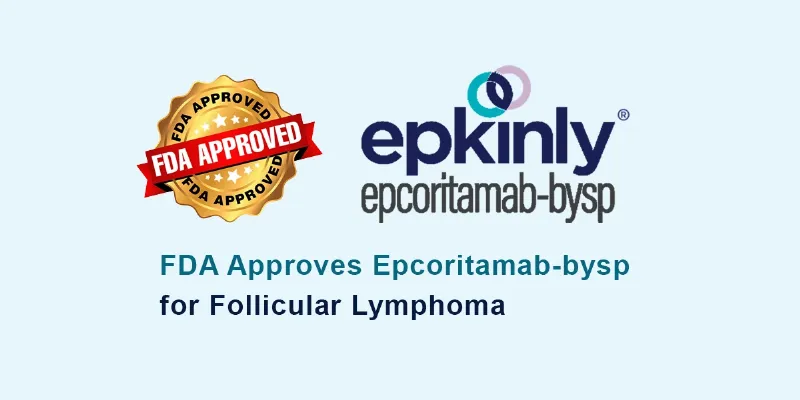FDA Approves Epcoritamab-bysp as the First Bispecific Antibody for Follicular Lymphoma

19 November 2025
The FDA has approved epcoritamab-bysp (Epkinly) with rituximab and lenalidomide for relapsed or refractory follicular lymphoma and has also granted full approval to the agent as monotherapy after two or more prior therapies. This decision, supported by the Phase 3 EPCORE FL 1 trial, establishes the regimen as the first bispecific antibody combination in this setting and demonstrates a 79 percent reduction in the risk of progression or death, along with high complete response rates and a manageable safety profile.
Epcoritamab-bysp is a subcutaneously administered IgG1 bispecific antibody created using DuoBody technology. By binding CD3 on T cells and CD20 on B cells at the same time, it triggers targeted T cell mediated cytotoxicity against malignant B cells. This mechanism, combined with outpatient-friendly delivery, has drawn attention as a practical immunotherapeutic option that could be deployed earlier in the treatment pathway.
"The results shown with EPKINLY + R2 in the EPCORE FL-1 study are incredibly meaningful, demonstrating durable responses compared to patients treated with R2 alone. These data, delivered by a regimen that's chemotherapy-free and can be administered in the outpatient setting, suggest that EPKINLY + R2 could potentially become a new standard of care," said Dr. Lorenzo Falchi, lymphoma specialist, department of medicine, Memorial Sloan Kettering Cancer Center.
EPCORE FL 1: A study that shifted expectations in relapsed disease
The FDA’s decision is grounded in results from the global, randomized, open label Phase 3 EPCORE FL 1 trial, which enrolled 488 adults with relapsed or refractory follicular lymphoma who had received a median of one prior therapy. One quarter had been treated with two prior lines and 17 percent had received three or more, illustrating the real-world treatment heterogeneity of the population.
The findings showed a clear and clinically meaningful advantage for the triplet regimen. The hazard ratio for progression free survival was 0.21, with a confidence interval of 0.13 to 0.33 and a p value below 0.0001. Median PFS was not reached in the combination arm but was 11.2 months with R2. The overall response rate reached 89 percent in the combination cohort compared with 74 percent in the control group. Complete responses occurred in 74 percent and 43 percent of patients, respectively.
Importantly, these benefits were consistent across patients with both indolent and more aggressive disease characteristics. Investigators emphasized the clinical significance of deep responses and prolonged remission in a setting where progression often accelerates with each relapse.
Safety profile
The combination regimen demonstrated a safety profile consistent with known toxicities of epcoritamab and of R2. Serious adverse reactions occurred in 51 percent of patients, with infections reported in 28 percent. Cytokine release syndrome emerged in 24 percent of individuals receiving the recommended step-up dosing schedule, and was primarily Grade 1 or Grade 2. Serious CRS accounted for 12 percent of cases. Immune effector cell associated neurotoxicity syndrome was rare and observed at Grade 1 in one patient. Boxed warnings for CRS and ICANS remain in the prescribing information, along with cautions regarding cytopenias, infections, and embryo fetal toxicity.
A broader shift in lymphoma immunotherapy
Epcoritamab-bysp, marketed as Epkinly in the United States and Japan and as Tepkinly in the European Union, is now approved in more than sixty five countries for selected lymphoma indications. The new authorization in follicular lymphoma also converts its accelerated monotherapy approval, granted in June 2024 for later line disease, into a full approval following confirmation of benefit at the Phase 3 level. The companies continue to expand the molecule’s clinical program.
Four additional Phase 3 studies are underway, examining epcoritamab in various combinations and treatment settings ranging from frontline diffuse large B cell lymphoma to relapsed disease following immunochemotherapy. These trials aim to determine whether the agent can further shift treatment paradigms in both indolent and aggressive lymphomas.
A pressing need for earlier and more effective options
Follicular lymphoma affects approximately 15,000 individuals each year in the United States. Although considered indolent, the disease is characterized by repeated relapses and a risk of transformation into diffuse large B cell lymphoma. As patients cycle through available therapies, response rates diminish and remission duration shortens. These clinical realities have intensified interest in immunotherapies capable of mobilizing the immune system with greater precision and durability.











Comments
No Comments Yet!